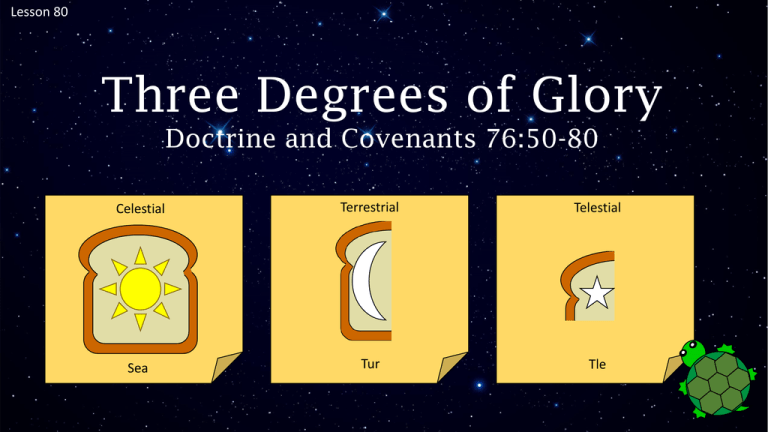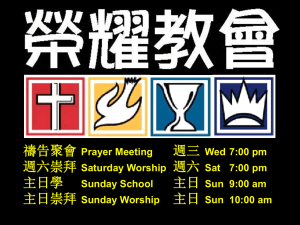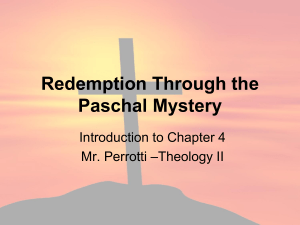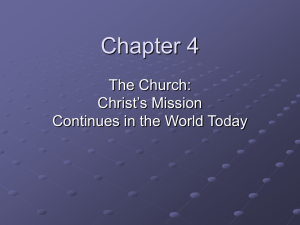Lesson 80 D&C 76 50-80 Three Degrees of Glory Power Pt
advertisement

Lesson 80 Three Degrees of Glory Doctrine and Covenants 76:50-80 Celestial Terrestrial Telestial Sea Tur Tle The Bread Yeast Flour Bread Yeast- 1 TBSP Water- 3 Cups warm water Flour- 6 ¼ cups Salt- 1 TBSP D&C 76:50 Salt Resurrection of the Just--Righteous There are two major resurrections: The resurrection of the just and the resurrection of the unjust. D&C 76 Joseph Fielding Smith ‘First, those who shall dwell in the presence of God and his Christ forever and ever’; and second, honorable men, those who belong to the terrestrial kingdom as well as those of the celestial kingdom. These Are They “At the time of the coming of Christ, ‘They who have slept in their graves shall come forth, for their graves shall be opened; and they also shall be caught up to meet him in the midst of the pillar of heaven. They are Christ’s, the first fruits, they who shall descend with him first, and they who are first caught up to meet him; and all this by the voice of the sounding of the trump of the angel of God.’ These are the just, ‘whose names are written in heaven, where God and Christ are the judge of all. These are they who are just men made perfect through Jesus the mediator of the new covenant, who wrought out this perfect atonement through the shedding of his own blood.” D&C 76 Joseph Fielding Smith For the Unjust “Following this great event, and after the Lord and the righteous who are caught up to meet him have descended upon the earth, there will come to pass another resurrection. This may be considered as a part of the first, although it comes later. In this resurrection will come forth those of terrestrial order, who were not worthy to be caught up to meet him, but who are worthy to come forth to enjoy the millennial reign.” This first resurrection will extend into the Millennium and include all those worthy of the celestial kingdom who live and die during the thousand years. D&C 76 Joseph Fielding Smith Recipe for Becoming a Celestial Person Testimony of Jesus Christ Baptized In His Name Faith Keeping the Commandments D&C 76:51-53 Receiving the Holy Ghost Celestial World Those who are of the Church of the Firstborn Those whose hands the Father has given all things Those who are priests and kings, who have received of his fullness and glory Those who are the order of Melchizedek “These shall dwell in the presence of God and his Christ forever and ever.” D&C 76:54-62 Those who are gods, even the sons of God Those Who Dwell With God They will accompany Christ when He comes again They are just and made perfect through Jesus Christ D&C 76:63-70 They who shall be part of the first resurrection They who will come forth in the resurrection of the just They will go to Mount Zion and be accompanied by angels “These are they whose bodies are celestial, whose glory is that of the sun, even the glory of God, the highest of all, whose glory the sun of the firmament is written of as being typical.” They will have their names written in heaven Terrestrial World Those who die without law Those who are kept in prison Those who didn’t receive the testimony of Jesus, while on the earth but received, it afterwards Those who were honorable but blinded by worldliness “Wherefore, they are bodies terrestrial, and not bodies celestial,” D&C 76:72-79 Those who receive part of His glory, but not all Those who are not valiant in the testimony of Jesus To Be Valiant “It is to be courageous and bold; to use all our strength, energy, and ability in the warfare with the world; to fight the good fight of faith. … The great cornerstone of valiance in the cause of righteousness is obedience to the whole law of the whole gospel.” “To be valiant in the testimony of Jesus is to ‘come unto Christ, and be perfected in him’; it is to deny ourselves ‘of all ungodliness,’ and ‘love God’ with all our ‘might, mind and strength.’ (Moro. 10:32.) D&C 76:79 Bruce R. McConkie Unshakable Conviction “To be valiant in the testimony of Jesus is to believe in Christ and his gospel with unshakable conviction. It is to know of the verity and divinity of the Lord’s work on earth. Enduring to the End More Than Believing “But this is not all. It is more than believing and knowing. We must be doers of the word and not hearers only. It is more than lip service; it is not simply confessing with the mouth the divine Sonship of the Savior. It is obedience and conformity and personal righteousness. “To be valiant in the testimony of Jesus is to ‘press forward with a steadfastness in Christ, having a perfect brightness of hope, and a love of God and of all men.’ It is to ‘endure to the end.’ It is to live our religion, to practice what we preach, to keep the commandments. D&C 76:79 Bruce R. McConkie PS—There is no End Telestial World Those who do not accept the gospel of Christ Those who deny the Holy Spirit Those who are thrust down to hell “These are they who receive not of his fulness in the eternal world, but of the Holy Spirit through the ministration of the terrestrial; And the terrestrial through the ministration of the celestial.” D&C 76:82-87 Those who are redeemed from the devil Sources: Suggested Hymn: #284 If You Could Hie To Kolob Be Valiant in Your Testimony (2:03) Joseph Fielding Smith (Doctrines of Salvation, 2:296.) Bruce R. McConkie (In Conference Report, Oct. 1974, pp. 45–46; or Ensign, Nov. 1974, pp. 33–35.) What Does It Mean to Be Sealed by the Holy Spirit of Promise? Elder Bruce R. McConkie defined the Holy Spirit of Promise as “the Holy Spirit promised the saints, or in other words the Holy Ghost. This name-title is used in connection with the sealing and ratifying power of the Holy Ghost, that is, the power given him to ratify and approve the righteous acts of men so that those acts will be binding on earth and in heaven. ‘All covenants, contracts, bonds, obligations, oaths, vows, performances, connections, associations, or expectations,’ must be sealed by the Holy Spirit of Promise, if they are to have ‘efficacy, virtue, or force in and after the resurrection from the dead; for all contracts that are not made unto this end have an end when men are dead.’ (D&C 132:7.) “To seal is to ratify, to justify, or to approve. Thus an act which is sealed by the Holy Spirit of Promise is one which is ratified by the Holy Ghost; it is one which is approved by the Lord; and the person who has taken the obligation upon himself is justified by the Spirit in the thing he has done. The ratifying seal of approval is put upon an act only if those entering the contract are worthy as a result of personal righteousness to receive the divine approbation. They ‘are sealed by the Holy Spirit of promise, which the Father sheds forth upon all those who are just and true.’ (D. & C. 76:53.) If they are not just and true and worthy the ratifying seal is withheld.” (Mormon Doctrine, pp. 361–62; see also Notes and Commentary on D&C 132:7.) What Is the Church of the Firstborn? “Those who gain exaltation in the celestial kingdom are those who are members of the Church of the Firstborn; in other words, those who keep all the commandments of the Lord. … “The Lord has made it possible for us to become members of the Church of the Firstborn, by receiving the blessings of the house of the Lord and overcoming all things. Thus we become heirs, ‘priests, and kings, who have received of his fulness, and of his glory,’ who shall ‘dwell in the presence of God and his Christ forever and ever,’ with full exaltation.” (Smith, Doctrines of Salvation, 2:41–42.) Certain apostates have taken this sacred name upon themselves, blasphemously claiming to have met all of these requirements, when they are in fact in a state of wickedness and rebellion. Do Those Who Receive the Gospel in the Spirit World Inherit the Terrestrial Kingdom? Those who hear the gospel in mortality and do not accept it but lead otherwise honorable lives will inherit the terrestrial kingdom. Those who do not have the opportunity to hear the gospel in mortality but accept it in the spirit world can inherit the celestial kingdom. Joseph Smith learned through another revelation that “all who have died without a knowledge of this gospel, who would have received it if they had been permitted to tarry, shall be heirs of the celestial kingdom of God” (D&C 137:7). Those “who received not the testimony of Jesus in the flesh” (D&C 76:74) are those who heard the gospel in mortality and rejected it. If they “afterwards received it” (v. 74), that is, in the spirit world, they will go to the terrestrial kingdom. Elder Bruce R. McConkie taught the foolishness of believing that a person can reject the gospel in this life, accept it in the next, and still inherit celestial glory. “This life is the time and day of our probation. After this day of life, which is given us to prepare for eternity, then cometh the night of darkness wherein there can be no labor performed. “For those who do not have an opportunity to believe and obey the holy word in this life, the first chance to gain salvation will come in the spirit world. If those who hear the word for the first time in the realms ahead are the kind of people who would have accepted the gospel here, had the opportunity been afforded them, they will accept it there. … “… Those who reject the gospel in this life and then receive it in the spirit world go not to the celestial, but to the terrestrial kingdom.” (“The Seven Deadly Heresies,” in Speeches of the Year, 1980 [Provo: Brigham Young University Press, 1981], pp. 77–78.) Elder Theodore M. Burton said: “There are many in this world who lived and died without ever having an opportunity to hear the gospel of Jesus Christ. We know that there are many men and women who die unbaptized, because some teacher, missionary, or leader who should have taught them was so poorly trained, so lacking in faith, and so unprepared to bear personal witness of Jesus Christ that the hearer never understood the message as he should have done. Should such people be damned forever for lack of proper instruction, because of an accident of birth, or because of the inadequacies of others? I say: ‘No!’ God is a God of justice and love and mercy. Every man is entitled to a just chance to know and accept Jesus Christ or to reject him if he feels the price of acceptance is too high” (in Conference Report, Apr. 1964, 72).











